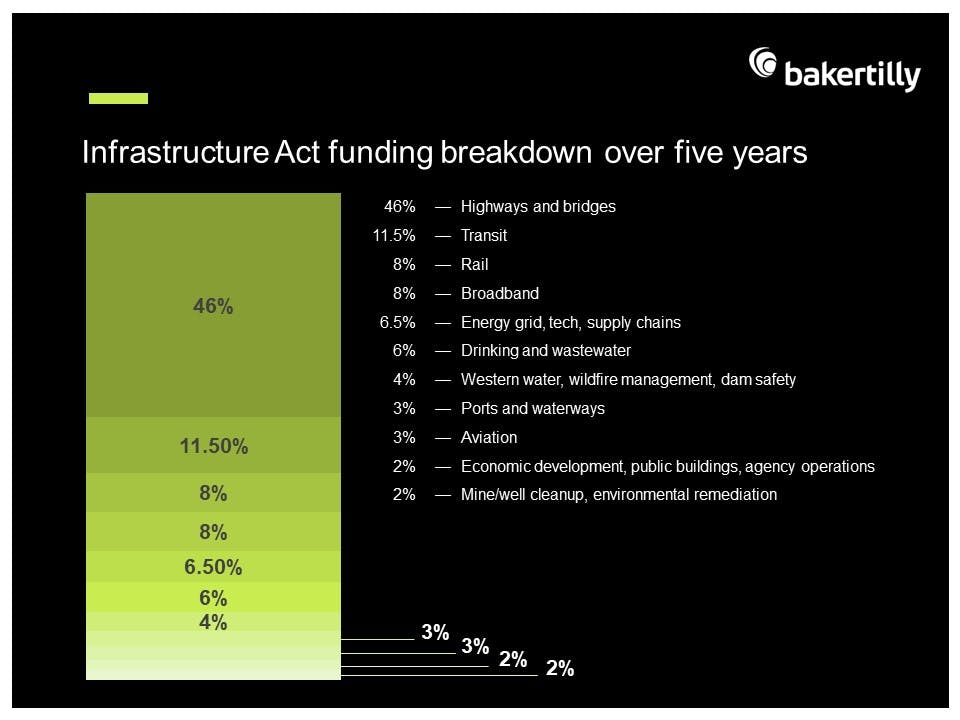
State and local governments have historic opportunity to strengthen communities with Infrastructure Act funding
The U.S. House of Representatives passed the $1.2 trillion bipartisan Infrastructure Investment and Jobs Act (Infrastructure Act, or IIJA) on Friday, Nov. 5. The Infrastructure Act, which represents the largest investment in the country’s infrastructure in decades, is expected to become law on Monday, Nov. 15, after being signed by President Biden.
The Infrastructure Act’s monumental five-year federal funding package will help state and local governments grow and sustain their economies, create jobs, enhance community resiliency and aim to improve America’s infrastructure grade and global ranking.

View the fact sheet of your state’s/territory’s specific funding allocations here on the White House’s website.
Baker Tilly can help
At Baker Tilly, we have decades of experience helping state and local governments lay the financial groundwork for infrastructure and other community projects of all kinds.
Chart your community’s path to economic recovery with COMPASS
Baker Tilly’s comprehensive federal funding assessment, COMPASS, is an interactive advisory delivery model that takes into account your community’s specific priorities, then designs a tailored investment and funding strategy to accomplish its recovery and growth objectives. Our collaborative step-by-step process meets each community where you are today by assessing your current status and future goals to provide recommended actions to leverage federal funding programs, including American Rescue Plan (ARP) and IIJA, as well as state-specific programs for which each community is eligible.
The end result is a meaningful, understandable financial plan to help your community maneuver through federal, state and local funding initiatives during this unprecedented time.
Count on our government specialists
Our team of more than 400 public sector Value Architects™ across 17 states is actively working with communities to help develop an effective spending strategy and prepare to procure and comply with Infrastructure Act funding. Lean on us to:
- Collaborate on a strategic plan for IIJA funding, considering your community’s priorities and infrastructure improvement needs (similar to how we’re helping communities develop ARP funding strategies)
- Develop tools to assist in managing your organization’s construction risk and project management
- Connect state and local governments to private investors and public-private partnership opportunities
- Formulate strategies to help achieve your community’s specific broadband goals
- Assess and mitigate cybersecurity, IT and other risks related to infrastructure upgrades
- Prepare for single audit and other accounting/reporting compliance
Connect with us to learn more.
Infrastructure Act funding breakdown
The IIJA includes $550 billion in new funding for roads, bridges, public transportation, public power, water and sewer and broadband upgrades.
The IIJA will provide an estimated $110 billion investment for roads, bridges and major infrastructure projects, including funding for bridge repair, replacement and rehabilitation; major projects considered too large or complex for traditional funding programs; transportation safety and money to reconnect communities.
The infrastructure funding package will also invest $39 billion to modernize public transit, including repairing and upgrading existing infrastructure, improving accessibility and bringing transit services to new communities. Additionally, the deal calls for $66 billion to improve the Northeast Corridor passenger and freight rail service and bring transit service to new communities. This will be the largest federal investment in public transit in our country’s history.
The Infrastructure Act includes $65 billion to improve the nation’s broadband infrastructure – building on the billions of dollars provided for broadband deployment in the American Rescue Plan – and aims to help lower the price households pay for internet service and ensure everyone has access to the internet.
The package includes $65 billion to rebuild the electric grid and protect against power outages, improving the reliability and resiliency of the U.S. power grid. It will also boost carbon capture technologies and more environmentally friendly electricity sources like clean hydrogen.
The IIJA will invest more than $50 billion through the U.S. Environmental Protection Agency (EPA) to upgrade water and sewer infrastructure and improve utility system resiliency to protect them from drought, floods and cyber-attacks. This includes over $20 billion for safe drinking water, $15 billion to replace lead pipes and over $12 billion to ensure clean drinking water for communities. This will be the largest investment in clean drinking water and waste water infrastructure in American history.
The Infrastructure Act will invest $17 billion in port infrastructure and $25 billion in airport repair and maintenance, congestion and emissions reduction and promotion of electrification and other low-carbon technologies.
The IIJA will provide nearly $21 billion to clean up Superfund and brownfield sites, reclaim abandoned mine land and cap orphaned gas wells.
The deal also includes approximately $7.5 billion to build a nationwide network of plug-in electric vehicle chargers and another $7.5 billion for zero- and low-emission buses and ferries, aiming to deliver thousands of electric school buses to districts across the country.
© 2024 Baker Tilly US, LLP
